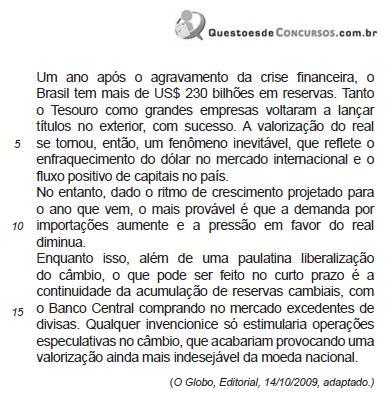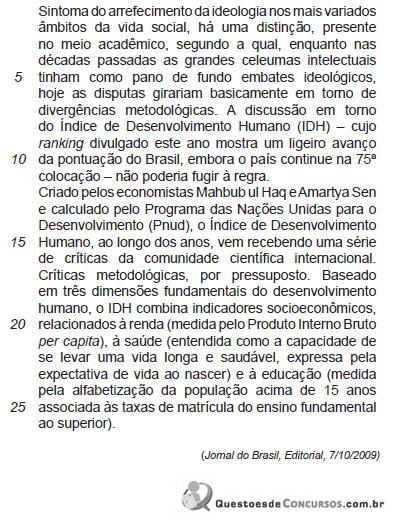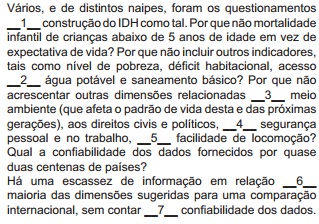Questões de Concurso
Comentadas para analista tributário da receita federal
Foram encontradas 306 questões
Resolva questões gratuitamente!
Junte-se a mais de 4 milhões de concurseiros!
Xi 5 6 7 8 9
fi 2 6 6 4 3
How long can the run on the dollar continue? Last
year's dollar slump, with its attendant rise in commodity
prices, ended when the market put paid to it. This time
governments are attempting to slow it down. But it is not,
as widely expected, the US government that is doing
this. Instead, the Canadian dollar dropped sharply on
Tuesday after the Bank of Canada issued a warning over
the currency's recent strength. Brazil's government went
further, imposing capital controls to stop the real gaining
at the dollar's expense. Other countries, it appears, have
more to lose from a weak dollar than the US does.
Perhaps as a result, there was a day's pause in the
trade that has seen the dollar hit 14-month lows while oil,
denominated in dollars, briefl y hit $80 a barrel before falling.
Brazil's imposition of a 2 per cent tax on capital infl ows, to
both stocks and bonds, showed strong intent. This move
brought the real, which has risen 54.5 per cent against the
dollar since its nadir, down by 3.8 per cent. The Bovespa
stock index, which has tripled since its low, fell 7.5 per cent
in dollar terms at one point.
Brazil evidently fears that an overpriced real could endanger
its recovery. Other exporters will be watching closely.
(Source: the Financial Times October 20- www.ft.com, adapted)
How long can the run on the dollar continue? Last
year's dollar slump, with its attendant rise in commodity
prices, ended when the market put paid to it. This time
governments are attempting to slow it down. But it is not,
as widely expected, the US government that is doing
this. Instead, the Canadian dollar dropped sharply on
Tuesday after the Bank of Canada issued a warning over
the currency's recent strength. Brazil's government went
further, imposing capital controls to stop the real gaining
at the dollar's expense. Other countries, it appears, have
more to lose from a weak dollar than the US does.
Perhaps as a result, there was a day's pause in the
trade that has seen the dollar hit 14-month lows while oil,
denominated in dollars, briefl y hit $80 a barrel before falling.
Brazil's imposition of a 2 per cent tax on capital infl ows, to
both stocks and bonds, showed strong intent. This move
brought the real, which has risen 54.5 per cent against the
dollar since its nadir, down by 3.8 per cent. The Bovespa
stock index, which has tripled since its low, fell 7.5 per cent
in dollar terms at one point.
Brazil evidently fears that an overpriced real could endanger
its recovery. Other exporters will be watching closely.
(Source: the Financial Times October 20- www.ft.com, adapted)
How long can the run on the dollar continue? Last
year's dollar slump, with its attendant rise in commodity
prices, ended when the market put paid to it. This time
governments are attempting to slow it down. But it is not,
as widely expected, the US government that is doing
this. Instead, the Canadian dollar dropped sharply on
Tuesday after the Bank of Canada issued a warning over
the currency's recent strength. Brazil's government went
further, imposing capital controls to stop the real gaining
at the dollar's expense. Other countries, it appears, have
more to lose from a weak dollar than the US does.
Perhaps as a result, there was a day's pause in the
trade that has seen the dollar hit 14-month lows while oil,
denominated in dollars, briefl y hit $80 a barrel before falling.
Brazil's imposition of a 2 per cent tax on capital infl ows, to
both stocks and bonds, showed strong intent. This move
brought the real, which has risen 54.5 per cent against the
dollar since its nadir, down by 3.8 per cent. The Bovespa
stock index, which has tripled since its low, fell 7.5 per cent
in dollar terms at one point.
Brazil evidently fears that an overpriced real could endanger
its recovery. Other exporters will be watching closely.
(Source: the Financial Times October 20- www.ft.com, adapted)
How long can the run on the dollar continue? Last
year's dollar slump, with its attendant rise in commodity
prices, ended when the market put paid to it. This time
governments are attempting to slow it down. But it is not,
as widely expected, the US government that is doing
this. Instead, the Canadian dollar dropped sharply on
Tuesday after the Bank of Canada issued a warning over
the currency's recent strength. Brazil's government went
further, imposing capital controls to stop the real gaining
at the dollar's expense. Other countries, it appears, have
more to lose from a weak dollar than the US does.
Perhaps as a result, there was a day's pause in the
trade that has seen the dollar hit 14-month lows while oil,
denominated in dollars, briefl y hit $80 a barrel before falling.
Brazil's imposition of a 2 per cent tax on capital infl ows, to
both stocks and bonds, showed strong intent. This move
brought the real, which has risen 54.5 per cent against the
dollar since its nadir, down by 3.8 per cent. The Bovespa
stock index, which has tripled since its low, fell 7.5 per cent
in dollar terms at one point.
Brazil evidently fears that an overpriced real could endanger
its recovery. Other exporters will be watching closely.
(Source: the Financial Times October 20- www.ft.com, adapted)
How long can the run on the dollar continue? Last
year's dollar slump, with its attendant rise in commodity
prices, ended when the market put paid to it. This time
governments are attempting to slow it down. But it is not,
as widely expected, the US government that is doing
this. Instead, the Canadian dollar dropped sharply on
Tuesday after the Bank of Canada issued a warning over
the currency's recent strength. Brazil's government went
further, imposing capital controls to stop the real gaining
at the dollar's expense. Other countries, it appears, have
more to lose from a weak dollar than the US does.
Perhaps as a result, there was a day's pause in the
trade that has seen the dollar hit 14-month lows while oil,
denominated in dollars, briefl y hit $80 a barrel before falling.
Brazil's imposition of a 2 per cent tax on capital infl ows, to
both stocks and bonds, showed strong intent. This move
brought the real, which has risen 54.5 per cent against the
dollar since its nadir, down by 3.8 per cent. The Bovespa
stock index, which has tripled since its low, fell 7.5 per cent
in dollar terms at one point.
Brazil evidently fears that an overpriced real could endanger
its recovery. Other exporters will be watching closely.
(Source: the Financial Times October 20- www.ft.com, adapted)
How long can the run on the dollar continue? Last
year's dollar slump, with its attendant rise in commodity
prices, ended when the market put paid to it. This time
governments are attempting to slow it down. But it is not,
as widely expected, the US government that is doing
this. Instead, the Canadian dollar dropped sharply on
Tuesday after the Bank of Canada issued a warning over
the currency's recent strength. Brazil's government went
further, imposing capital controls to stop the real gaining
at the dollar's expense. Other countries, it appears, have
more to lose from a weak dollar than the US does.
Perhaps as a result, there was a day's pause in the
trade that has seen the dollar hit 14-month lows while oil,
denominated in dollars, briefl y hit $80 a barrel before falling.
Brazil's imposition of a 2 per cent tax on capital infl ows, to
both stocks and bonds, showed strong intent. This move
brought the real, which has risen 54.5 per cent against the
dollar since its nadir, down by 3.8 per cent. The Bovespa
stock index, which has tripled since its low, fell 7.5 per cent
in dollar terms at one point.
Brazil evidently fears that an overpriced real could endanger
its recovery. Other exporters will be watching closely.
(Source: the Financial Times October 20- www.ft.com, adapted)
grouping, ended their fi rst major summit by calling for a
stable, predictable and more diversifi ed international
monetary system. But the leaders of Brazil, Russia, India
and China, stopped short of criticising the world's dominant
currency, the US dollar. The group repeated calls for a
bigger say in the global fi nancial system through greater
representation at major institutions, such as the World
Bank.
But the fi nal statement issued by the leaders made no
reference to developing new reserve currencies to challenge
the dollar, which Russia had called for at a separate event
earlier in the day.
Analysts say that as the global recession bites, the four Bric
nations are showing a growing willingness to work together.
One expert claimed the signifi cance of the summit would
be political rather than economic
(BBC News 16/6/09, adapted)
grouping, ended their fi rst major summit by calling for a
stable, predictable and more diversifi ed international
monetary system. But the leaders of Brazil, Russia, India
and China, stopped short of criticising the world's dominant
currency, the US dollar. The group repeated calls for a
bigger say in the global fi nancial system through greater
representation at major institutions, such as the World
Bank.
But the fi nal statement issued by the leaders made no
reference to developing new reserve currencies to challenge
the dollar, which Russia had called for at a separate event
earlier in the day.
Analysts say that as the global recession bites, the four Bric
nations are showing a growing willingness to work together.
One expert claimed the signifi cance of the summit would
be political rather than economic
(BBC News 16/6/09, adapted)
grouping, ended their fi rst major summit by calling for a
stable, predictable and more diversifi ed international
monetary system. But the leaders of Brazil, Russia, India
and China, stopped short of criticising the world's dominant
currency, the US dollar. The group repeated calls for a
bigger say in the global fi nancial system through greater
representation at major institutions, such as the World
Bank.
But the fi nal statement issued by the leaders made no
reference to developing new reserve currencies to challenge
the dollar, which Russia had called for at a separate event
earlier in the day.
Analysts say that as the global recession bites, the four Bric
nations are showing a growing willingness to work together.
One expert claimed the signifi cance of the summit would
be political rather than economic
(BBC News 16/6/09, adapted)
grouping, ended their fi rst major summit by calling for a
stable, predictable and more diversifi ed international
monetary system. But the leaders of Brazil, Russia, India
and China, stopped short of criticising the world's dominant
currency, the US dollar. The group repeated calls for a
bigger say in the global fi nancial system through greater
representation at major institutions, such as the World
Bank.
But the fi nal statement issued by the leaders made no
reference to developing new reserve currencies to challenge
the dollar, which Russia had called for at a separate event
earlier in the day.
Analysts say that as the global recession bites, the four Bric
nations are showing a growing willingness to work together.
One expert claimed the signifi cance of the summit would
be political rather than economic
(BBC News 16/6/09, adapted)


A economia real nos Estados Unidos e na Europa segue em compasso de espera. Isso signifi ca que o produto e o emprego seguem em declínio, (1) mas a uma velocidade menor. Seja como for, as injeções de liquidez, os programas de compra de ativos podres,(2) as garantias oferecidas pelas autoridades e a capitalização das instituições fi nanceiras não fi zeram pouco. Além de construir um piso para a defl ação de ativos, as intervenções de provimento de liquidez suscitaram,(3) diriam os keynesianos,(3) um movimento global no interior da circulação fi nanceira. O inchaço da circulação fi nanceira teve efeitos mesquinhos sobre a circulação industrial,(4) ou seja,(4) sobre a movimentação do crédito e da moeda destinada a impulsionar a produção e o emprego. Observa-se,(5) no entanto,(5) um rearranjo dentro do estoque de riqueza que responde aos preços esperados dos ativos "especulativos" por parte dos investidores que sobreviveram ao colapso da liquidez. Agarrados aos salva-vidas lançados com generosidade pelo gestor em última instância do dinheiro - esse bem público objeto da cobiça privada - os senhores da finança tratam de restaurar as práticas e operações de "normalização dos mercados", isto é, aquelas que levaram à crise. (Luiz Gonzaga Beluzzo, adaptado do Valor Econômico de 14 de outubro de 2009)

